Jan.23.2010
by Ed Beakley
Haiti – Essence of Decision – Operation Unified Response
 In attempt to establish a framework for discussion of the many facets of the Haiti disaster, and as a precursor to addressing the question – What kind of a community or organization –or indeed, group of organizations – can survive and thrive in unconventional, uncertain and severe crisis environments? - multiple articles from varying perspectives on Operation Unified Response are being posted on DaVinci’s Horse, the Facebook Page.
In attempt to establish a framework for discussion of the many facets of the Haiti disaster, and as a precursor to addressing the question – What kind of a community or organization –or indeed, group of organizations – can survive and thrive in unconventional, uncertain and severe crisis environments? - multiple articles from varying perspectives on Operation Unified Response are being posted on DaVinci’s Horse, the Facebook Page.
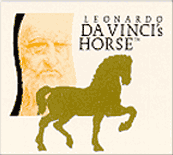
- Note:You do not have to be a Facebook Member to view the page and follow the links to articles.Facebook may present an interim page with requirement to click Continue. To go to DvH , after following a link click the page tab rather than using the back arrow.
Tags: Essential Elements of Information, Project White Horse, worst case disasters
Filed in Announcements | Comments Off
Jan.20.2010
by Ed Beakley

Boyd Compendium Edition Archive Facebook page “What Kind of War”
PWH begins 2010 with four new elements which can be viewed directly by clicking on the title below each picture for that element.
Continue Reading »
Tags: Project White Horse
Filed in Announcements | Comments Off
Jan.18.2010
by Ed Beakley
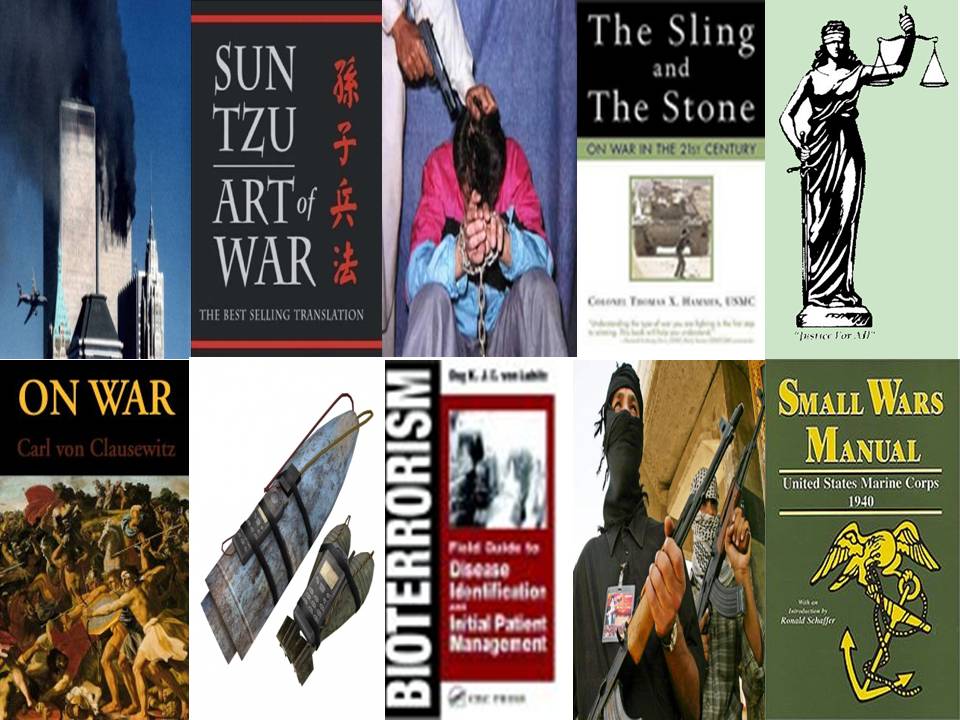
Miranda Rights, IEDs, Counter Terrorism, Weapons of Mass Destruction, “reasonable doubt,” Counter Insurgency, cyber war, Geneva Conventions, enemy combatants gang warfare and Drug wars,etc., etc, are all elements that must be considered in defining or even just establishing boundary conditions in a search for “what kind of war.” While certainly this series has not answered the question, the intent was to put in one place, discussion of at least some of the non-core World War II, non-core Cold War elements crucial to bounding the problem, leveraging serious writers with multiple perspectives. For ease of reference here are the posts/links with the main author or provider of the core thread in parenthesis:
- So What Kind of War Is It? (First in a Series) [Von Lubitz, Beakley]
- On War, On Crime – the Intersection [Sullivan, et. al]
- Civilian Courts no place for terrorists [Brooks]
- War? What War? [Krauthammer]
- Boundary Layers [Beakley]
- 5 Myths about keeping America safe from terrorism [Flynn]
- The war of new words: Why military history trumps buzzwords [Owen]
- No Exit [Bacevich]
- Square Pegs, Round Holes vs. “War Amongst the People” [Smith]
- Definitions or Targets [Ganor]
- Science, defence and strategy… and John Boyd [Elkus]
While the question what kind of war is it remains unanswered, this appears an appropriate place to suspend the series, at least for now, with one final thought from British General Sir Rupert Smith:
… we are living in a world of confrontations and conflicts rather than one of war and peace; one in which the clear categories of security and defence – the basic purposes for which force is used – have merged…
This is no longer industrial war… absolute and clear threats in recognizable groupings, and… stable political contexts for operations… our opponents are formless and their leaders and operatives are outside the structures in which we order the world and society… The threats they pose are not directly to our states or territories but to the security of our people, of other peoples, our assets and way of life… They are of and amongst the people – in the flesh and in the media – and it is there that the fight takes place.
The famous ballad from World War I days -”Over There” – cannot be this century’s hosting one for the boys song of record. For those interested in further reading, the following four books are most highly recommended.
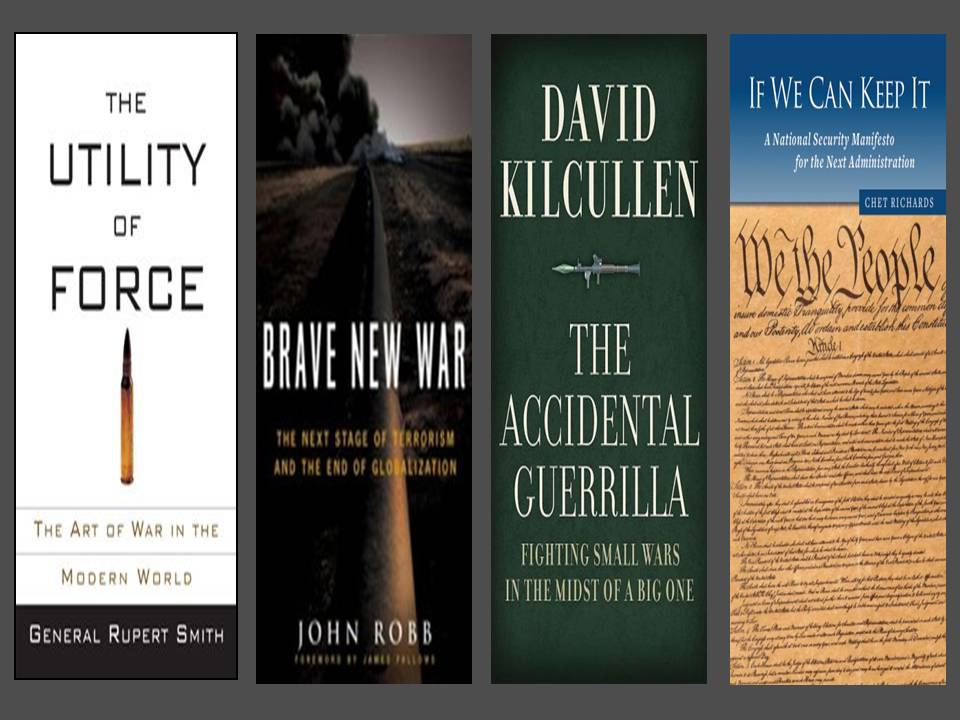
Tags: 4GW, Essential Elements of Information, Future Warfare, resilient communities
Filed in 4GW,Elements of Essential Information,What Kind of War,What Kind of War The Series | Comments Off
Jan.12.2010
by Ed Beakley
Essential Elements of Information for a Culture of Preparedness
Without strategy the science of war overtakes the art of war
The human decision-making process, Boyd argues, deals with this conundrum through a constant dialectic of creation and destruction of mental patterns and perceptions in response to a changing and complex observed reality. We cannot escape from chaos, rather we are most successful when we embrace it by shattering the rigid mental patterns that have built up and then synthesize the new realities we observe to create a new understanding. Such a process of structuring, dissolving, restructuring, and dissolving again must be repeated endlessly.
This series has attempted to highlight that no matter how well analyzed, no matter the length or the depth of discussion, no matter how well addressed in writing by a Sun Tzu, Carl von Clausewitz, Alfred Thayer Mahan, Winston Churchill, or Sir John Keegan, et al, success in war and warfare, must always be seen in light of “an evolving, open ended, far from equilibrium process of self-organization, emergence, and natural selection.” Those words from John Boyd’s last effort, Essence of Winning and Losing, seem a perfect match with the original question from Napoleonic times. The mismatch of “labels” with events and resultant ill-formed actions as described in these posts by multiple writers and analysts, would seem to signify the importance of answering the question, what kind of war is it, and the crucial need for destruction and creation – analysis with synthesis.
As this series draws to a close, Science, defence and stategy, by Adam Elkus, was recognized and excerpts selected as striking this issue point on. The full article can be found at the website openSecurity.
Adam Elkus is a past PWH contributor as co-author with John Sullivan of the Operational Art for Policing series (EEI#9). He is an analyst specializing in foreign policy and security. His articles have been published in West Point CTC Sentinel, Small Wars Journal, Defense and the National Interest, Foreign Policy in Focus, Red Team Journal, , and other publications. His Blog writing can be found at Rethinking Security and at GroupIntel Network where he hosts the Group Boyd, 4GW Theory, and Criminal Insurgency.
Science, defence and strategy; (excerpt)
by Adam Elkus
War has always been such a tremendously complex undertaking that every force waging it has sought to simplify and standardize. At the same time, this simplification and standardization is usually inimical to the kind of creativity needed to win. Finding a balance between the art and science of war has always been difficult, especially in an era thoroughly dominated by science in all major areas of everyday life.
Continue Reading »
Tags: 4GW, Essential Elements of Information
Filed in 4GW,Culture of Preparedness,Elements of Essential Information,What Kind of War,What Kind of War The Series | Comments Off
Jan.12.2010
by Ed Beakley
Essential Elements of Information for a Culture of Preparedness
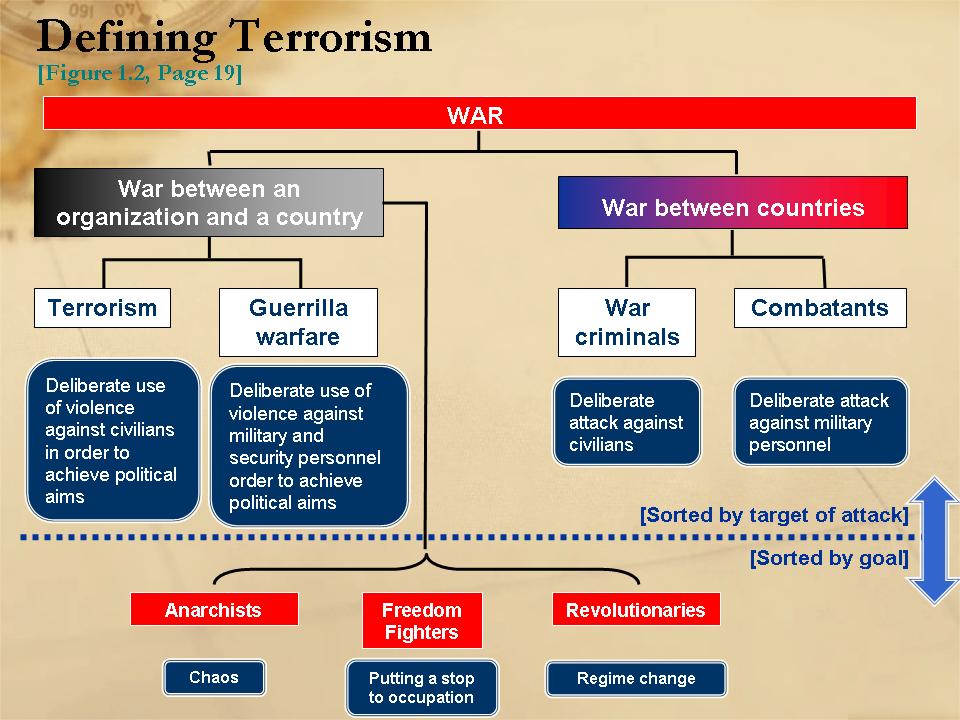
( From The Counter Terrorism Puzzle; A Guide for Decision Makers, used with permission of the author, Dr. Boaz Ganor, the Associate Dean of the Lauder School of Government, at the Interdisciplinary Center, Herzliya, Israel, and the founder and Executive Director of the International Institute for Counter-Terrorism )
The above graphic placing terrorism in context of war and the definitions below of many of the terms used throughout the “What kind of war” series are intended only as reference, not as anyone’s formal authorized definition. They have been gleaned from multiple sources. Of particular note should be the degree of overlap and ambiguity.
Definitions: Special Operations, Asymmetric Warfare, Terrorism, Guerrilla Warfare, Irregular Warfare, Unconventional Warfare, The Long War, Fourth Generation Warfare, Hybrid Warfare:
Continue Reading »
Tags: 4GW, Essential Elements of Information, Hybrid Warfare, Irregular Warfare, Terrorism
Filed in 4GW,Elements of Essential Information,Terrorism,What Kind of War,What Kind of War The Series | Comments Off
Jan.12.2010
by Ed Beakley
Essential Elements of Information for a Culture of Preparedness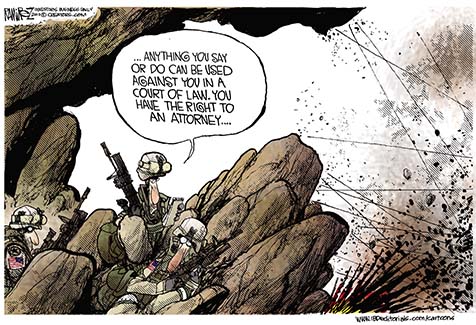
There seems to be a trend toward treating events of terrorism as if they were specifically a law-enforcement problem , rather than enemy operations in the context of war and warfare. Both require application of force “but for force to be effective the desired outcome of its use must be understood in such detail that the context is defined as well as the point of application.” (The Utility of Force; The Art of War in the Modern World by General Sir Rupert Smith)
The issue here is not crime or war, the context is rather that war plays out “amongst the people” – not only in the villages of Afghanistan, but as readily in the airports, cities, communities, and courtrooms of all nations. The application of force, -whether by police or military – AND of law are essential.
Continue Reading »
Tags: 4GW, Culture of Preparedness, Essential Elements of Information, resilient communities, Terrorism
Filed in 4GW,Culture of Preparedness,Elements of Essential Information,Terrorism,Uncategorized,What Kind of War,What Kind of War The Series | Comments Off
Jan.11.2010
by Ed Beakley
Essential Elements of Information for a Culture of Preparedness
America has an impressive record of starting wars but a dismal one of ending them well.
Andrew J. Bacevich is professor of history and international relations at Boston University. He is a retired Army Colonel, graduate of West Point, serving in Vietnam in 1970 and 71. In his books [The Limits of Power, The Long War, and The New American Militarism: How Americans are Seduced by War ], he is critical of American foreign policy in the post Cold War era, maintaining the United States has developed an over-reliance on military power, in contrast to diplomacy, to achieve its foreign policy aims. He also asserts that policymakers in particular, and the American people in general, overestimate the usefulness of military force in foreign affairs. Bacevich conceived The New American Militarism not only as “a corrective to what has become the conventional critique of U.S. policies since 9/11 but as a challenge to the orthodox historical context employed to justify those policies.” His new book Washington Rules: America’s Path to Permanent War is due out in the spring.
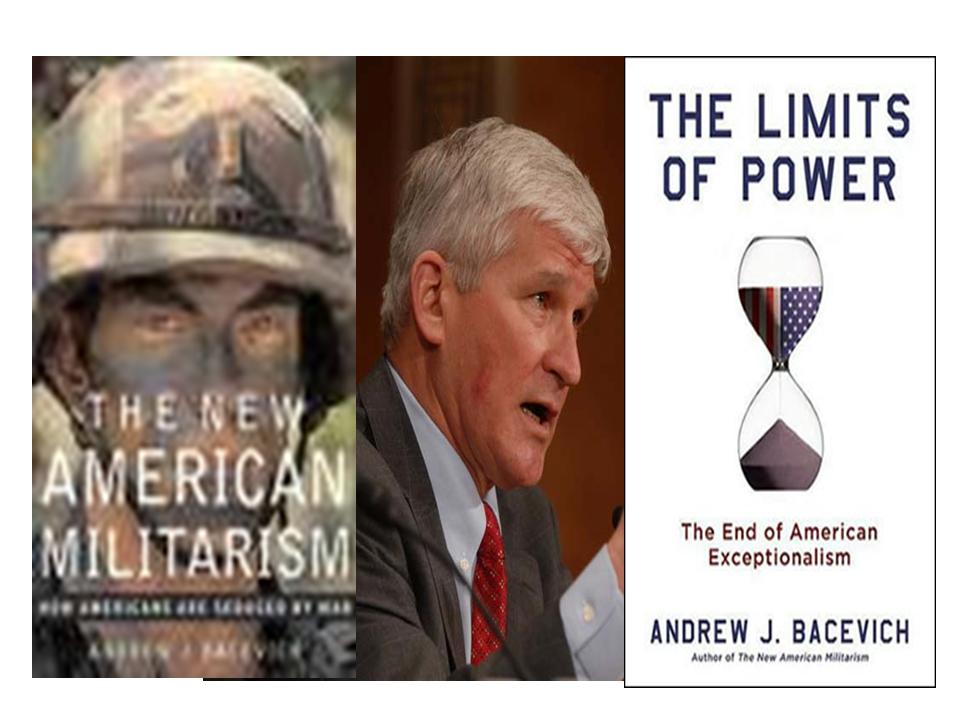
This article found on The American Conservative would appear consistent with his past writing and the excerpt is offered as yet another view of “what kind of war.”
No Exit (Excerpt)
by Andrew Bacevich
President Obama’s decision to escalate U.S. military involvement in Afghanistan earned him at most two muted cheers from Washington’s warrior-pundits. Sure, the president had acceded to Gen. Stanley McChrystal’s request for more troops. Already in its ninth year, Operation Enduring Freedom was therefore guaranteed to endure for years to come. The Long War begun on George W. Bush’s watch with expectations of transforming the Greater Middle East gained a new lease on life, its purpose reduced to the generic one of “keeping America safe.”
Yet the Long War’s most ardent supporters found fault with Obama’s words and demeanor. The president had failed to convey the requisite enthusiasm for sending young Americans to fight and die on the far side of the world …
Continue Reading »
Tags: Culture of Preparedness, Essential Elements of Information, resilient communities, Terrorism
Filed in Culture of Preparedness,Elements of Essential Information,Terrorism,What Kind of War,What Kind of War The Series | One response so far
Jan.11.2010
by Ed Beakley
Essential Elements of Information for a Culture of Preparedness
To say “warfare is changing” is banal, obvious and thus irrelevant. When did warfare ever not evolve? The acts of Sept. 11 changed nothing in the Thucydidean and Clausewitzian nature of war, or even its modern practice. America’s choice of response did change U.S. foreign policy and defense planning, but the attacks themselves were in no way indicative of any change in the aims and purposes, or even methods, of political violence.
In order to provide a very different perspective on “what kind of war is it,” excerpts of William Owen’s essay on Armed Forces Journal are provided below. Owen is former British Army and currently a full time writer, theorist and critic concentrating on infantry and doctrinal issues. His writing is most easily found on highly recommended Small Wars Journal.
My guess would be that he would disagree with much written in this series. My argument with his article would focus on the idea of serious need for clarity by use of appropriately defined terms as compared to consideration as “buzzwords,” simply because they did not appear in the text of On War by Carl von Clausewitz.
Essay: The war of new words: Why military history trumps buzzwords (excerpt)
by William F. Owen
War isn’t just transforming — it’s ushering in a whole new language to describe conflict, and this language is used in a way that pays little attention to logic or military history. Thus the forces we used to call guerrillas are now “hybrid threats.” Insurgencies are now “complex” and require “complex and adaptive” solutions. Jungles and cities are now “complex terrain.” Put simply, the discussion about future conflict is being conducted using buzzwords and bumper stickers.
The evidence that the threats of the 21st century are going to be that much different from the threats of the 20th is lacking. Likewise, there is no evidence that a “new way of war” is evolving or that we somehow had a previously flawed understanding.
Continue Reading »
Tags: Culture of Preparedness, Essential Elements of Information, Terrorism
Filed in 4GW,Elements of Essential Information,Terrorism,What Kind of War,What Kind of War The Series | One response so far
Jan.10.2010
by Ed Beakley
Essential Elements of Information for a Culture of Preparedness
… familiar arguments about what can and should be done to reduce America’s vulnerabilities are again filling the airwaves, editorial pages and blogosphere. Several of these arguments are based on assumptions that guided the U.S. response to the Sept. 11, 2001, attacks — and unfortunately, they are as unfounded now as they were then..
Stephen Flynn is the president of the Center for National Policy and author of “America the Vulnerable” and ”The Edge of Disaster: Rebuilding a Resilient Nation.” He is a retired Coast Guard Commander and spent a decade as a senior fellow for National Security Studies at the Council on Foreign Relations. The original article was published by the Washington Post on Sunday January 3, 2010.
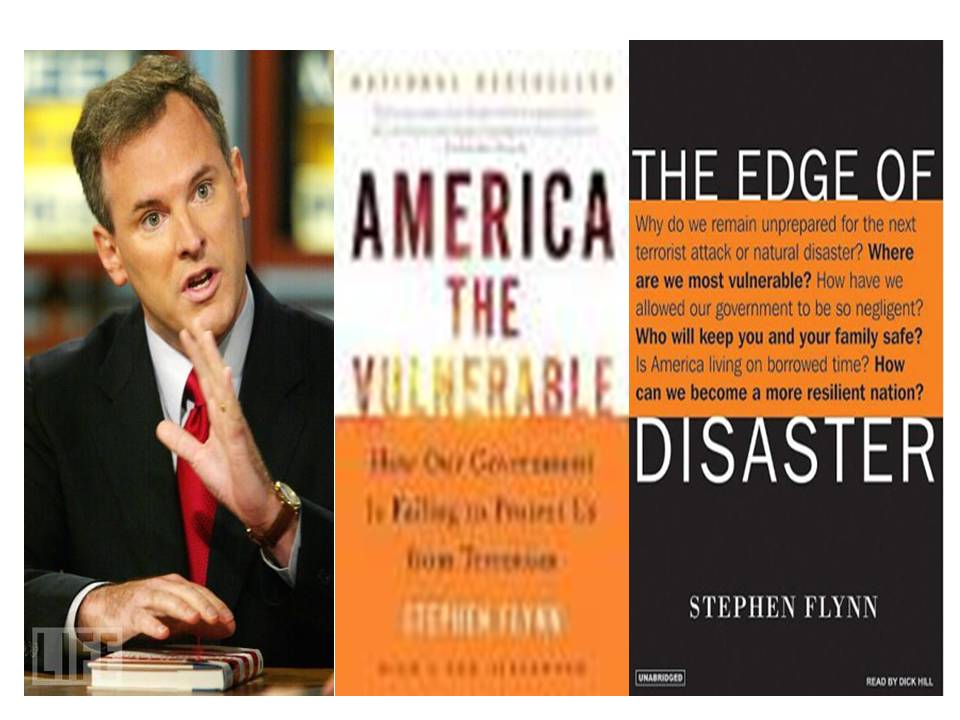
5 Myths about keeping America safe from terrorrism
by Stephen Flynn
With President Obama declaring a “systemic failure” of our security system in the wake of the attempted Christmas bombing of a Detroit-bound airliner, familiar arguments about what can and should be done to reduce America’s vulnerabilities are again filling the airwaves, editorial pages and blogosphere. Several of these arguments are based on assumptions that guided the U.S. response to the Sept. 11, 2001, attacks — and unfortunately, they are as unfounded now as they were then. The biggest whopper of all? The paternalistic assertion that the government can keep us all safe without our help.
Continue Reading »
Tags: Culture of Preparedness, Essential Elements of Information, resilient communities, Terrorism
Filed in Culture of Preparedness,Elements of Essential Information,Terrorism,What Kind of War,What Kind of War The Series | Comments Off
Jan.10.2010
by Ed Beakley
Essential Elements of Information for a Culture of Preparedness
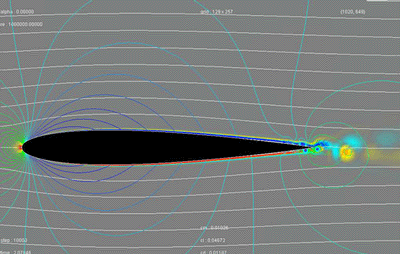
A ”lesson in aerodynamics” might be of interest as painting- hopefully- a useful “picture” of the period from shortly before the September 11, 2001 8th hour, 46th minute, 40th second impact of American Airlines Flight 11, on through the remainder of the day as initial reaction and response took place, and on into the 12th as intial world level response was planned.
Boundary conditions – the set of conditions specified for the behavior of the solution to a set of differential equations at the boundary of its domain – are important in determining the mathematical solutions to many physical problems.
Continue Reading »
Tags: 4GW, Culture of Preparedness, Essential Elements of Information, resilient communities, Terrorism
Filed in 4GW,Culture of Preparedness,Elements of Essential Information,Resilient Community,Terrorism,What Kind of War,What Kind of War The Series | Comments Off
![]() In attempt to establish a framework for discussion of the many facets of the Haiti disaster, and as a precursor to addressing the question – What kind of a community or organization –or indeed, group of organizations – can survive and thrive in unconventional, uncertain and severe crisis environments? - multiple articles from varying perspectives on Operation Unified Response are being posted on DaVinci’s Horse, the Facebook Page.
In attempt to establish a framework for discussion of the many facets of the Haiti disaster, and as a precursor to addressing the question – What kind of a community or organization –or indeed, group of organizations – can survive and thrive in unconventional, uncertain and severe crisis environments? - multiple articles from varying perspectives on Operation Unified Response are being posted on DaVinci’s Horse, the Facebook Page.









